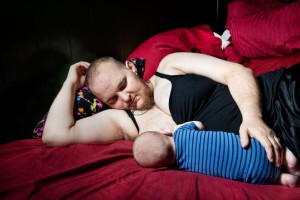My Brother’s Pregnancy and the Making of a New American Family
< < Go Back
by Jessi Hempel,
My brother Evan was born female. He came out as transgender 16 years ago but never stopped wanting to have a baby. This spring he gave birth to his first child.
My brother Evan, 35, is a stocky guy of medium height with a trimmed, fuzzy blond beard and two gem studs in each earlobe. He usually wears a Red Sox hat, and when he’s nervous, he’ll remove it and obsessively bend the rim. But on that September afternoon, both of his hands were clutching his phone, the right one cupping the left for privacy. “Hello?”
“This is Dr. Kowalik,” said the voice. The identification was unnecessary. Ania Kowalik is a reproductive endocrinologist at a clinic called Fertility Solutions in Dedham, Mass. They’d spoken regularly for more than six months. Evan, who was born female, had wanted to be a parent since he was very young, when he played with dolls just a bit longer than the other kids. He’d helped pay for college by nannying triplets. And when he first came out to friends as transgender at 19, changing his name and beginning his long physical transformation, he didn’t stop adding to the list of baby names in the back of his journal: Kaya, Eleanor, Huxley.
She was brief: Evan was pregnant. Kowalik told him he had low levels of progesterone, a hormone that helps maintain a healthy pregnancy, and prescribed some pills for him to start taking right away. “Congratulations,” she said after a pause. “This is a good start.”
I’d have no reason to tell you about this moment in my brother’s life were it not for the fact of his gender. Now that gay marriage is legal, the social battleground has shifted to new frontiers, frontiers that include the most private aspects of people’s lives. Transgender Americans have gained greater visibility and acceptance as stars like Caitlyn Jenner and Laverne Cox have trained a pop-culture spotlight on trans issues. Corporate leaders across the Fortune 500 have moved to protect their transgender employees. And in May, the Obama Administration declared that all public schools must treat students equally regardless of their gender identity, classifying inner feelings of maleness and femaleness as protected by the government. We have come to the point where the President of the United States can candidly and comfortably discuss gender fluidity.
Pregnancies like Evan’s—and the many that are likely to follow—will stretch our cultural perceptions of gender norms even further. Americans are just starting to open up to the idea that you may be born into a female body, but believe that you are really a man. But what if you are born into a female body, know you are a man and still want to participate in the traditionally exclusive rite of womanhood? What kind of man are you then?
This question can bother people. It can make them uncomfortable. That’s partly why, when Evan texted me to say, “I’m pregnant!” I was excited for him, but also frightened. I thought about what strangers might say to my bearded, big-bellied little brother when he was nine months along. And I wondered, Would he be safe?
my brother had already come out to himself and friends as trans, but he didn’t tell me until 2003, when he started taking hormones. He called me to say that when he came for my graduation, I should call him Evan.
The transition was messy. Our parents were supportive but distracted. They were in a protracted divorce after my father had, at 50, come out as gay. Katje and I dated women, and I would kid Evan that being gay wasn’t rebellious enough in our family; he had to do us one better and change gender. Looking back, I regret these jokes. They were a crass way to cover the pain of knowing that the childhood we all shared–the one in which we were three round-faced, pigtailed girls in matching dresses–had been a charade for my brother.
I said the wrong things all the time. That first year Evan looked strange to me, like a butch lady or a girly man. He went through a sped-up version of puberty that brought changes to his voice and testosterone-fueled impulses he didn’t understand. I often she’d him by accident. I’d forget and call him by his given female name, or refer to him as her.
his health insurance refused to cover his pregnancy test because he was male, he spent several hours explaining his situation to a representative, waiting on hold and explaining it again. “My sex is female, and my gender is male,” he told the rep. She was able to override the system and get the cost reimbursed
More From TIME Magazine:




